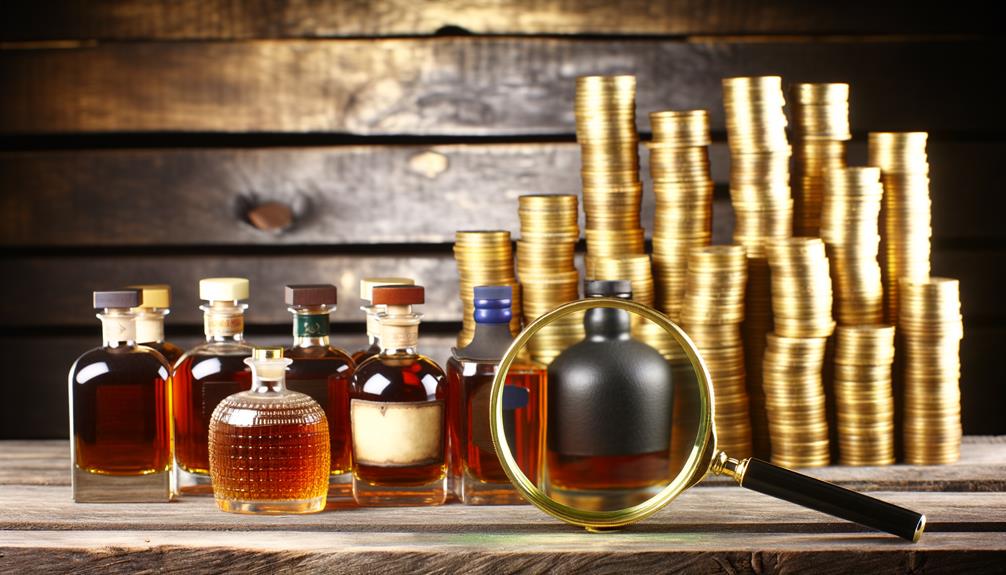In the investment universe, whiskey is emerging as the new star, sparkling even brighter than gold. From keeping a close eye on the market trends, I can confidently say that collectible whiskeys have consistently outpaced many traditional investments in the past ten years. This isn’t a fleeting trend – the surge is backed by solid demand, limited availability, and the escalating status of whiskey as a high-end commodity. However, this doesn’t mean that every bottle you purchase will be a fortune-maker. The market is intricate with its own subtleties and potential drawbacks. So, what’s the best way to make an informed decision and avoid your precious whiskey turning into mere cheap liquor? Stick with me, as I offer my knowledge and advice on making wise, profitable investments in collectible whiskeys.
Reasons to Invest in Whiskey
Investing in whiskey is more than indulging in the dark, smoky flavors; it’s an interesting financial venture. Historical data shows us that the whiskey market has grown impressively, and it’s expected to reach a staggering $109 billion by 2025. This isn’t just a hobby for whiskey aficionados; it’s a smart investment choice.
Here’s a thought: private whiskey investors see average annual returns of around 10%. The rarer and more exceptional the bottle, the higher the returns, making these the top bottles to consider. This isn’t solely about the excitement of finding a hidden gem on a dusty shelf. It’s about diligent research, understanding the value of genuine bottles, recognizing important brands, and keeping an eye on market trends and predictions.
Another appealing aspect of whiskey investment is its accessibility. Online platforms, such as Vinovest, allow you to start investing with just a couple hundred dollars. They provide comprehensive whiskey investing services, simplifying the process for collectors and investors alike. This isn’t just about investing; it’s about being part of a community of fellow enthusiasts who appreciate the value of every sip of this exquisite beverage.
Guide to Whiskey Investment
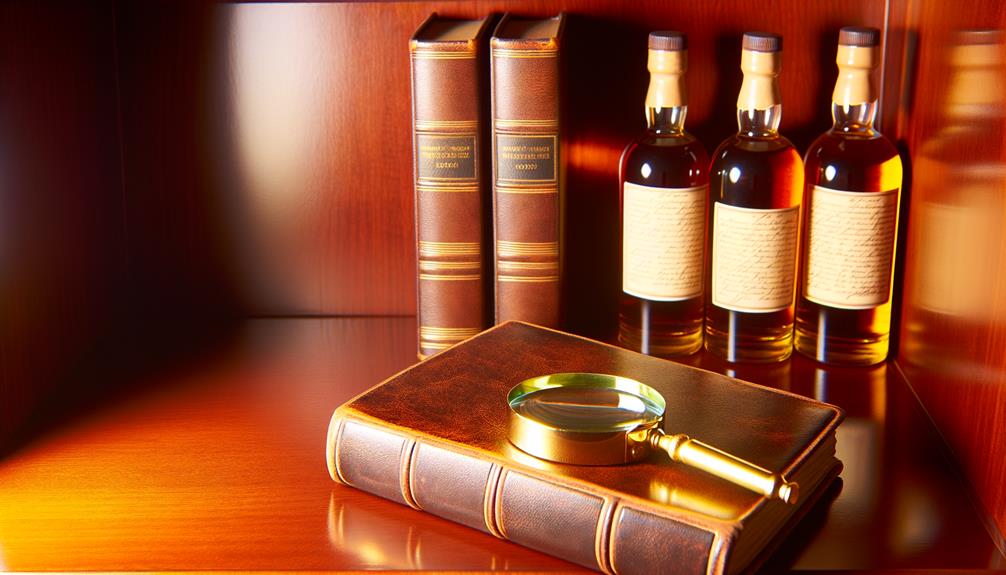
Jumping into whiskey investment isn’t just about enjoying the robust tastes; it’s a venture demanding in-depth knowledge of past market performance, potential gains, and the significance of availability.
Being an investor in whiskey myself, I’ve observed the industry’s consistent rise in the previous ten years. Single Malt Whisky, for example, has witnessed a significant surge in its market value, making it a solid choice for alternative investment. The Rare Whisky Apex 1000 Index itself has escalated by more than 416%.
Whiskey investment isn’t just a collector’s game. Thanks to web-based platforms like Vinovest, anyone can begin their investment journey with just a few hundred dollars. Whether you’re purchasing bottles, casks or stocks, the process is much easier than before.
The most valuable advice I can share is to keep an eye on market shifts. Exceptional, hard-to-find bottles often command higher prices at auction, but it’s vital to recognize authentic bottles and future collectible brands. Bear in mind, investing in whiskey isn’t only about enjoying a drink; it’s stepping into the intriguing world of spirits.
Key Factors for Whiskey Investment
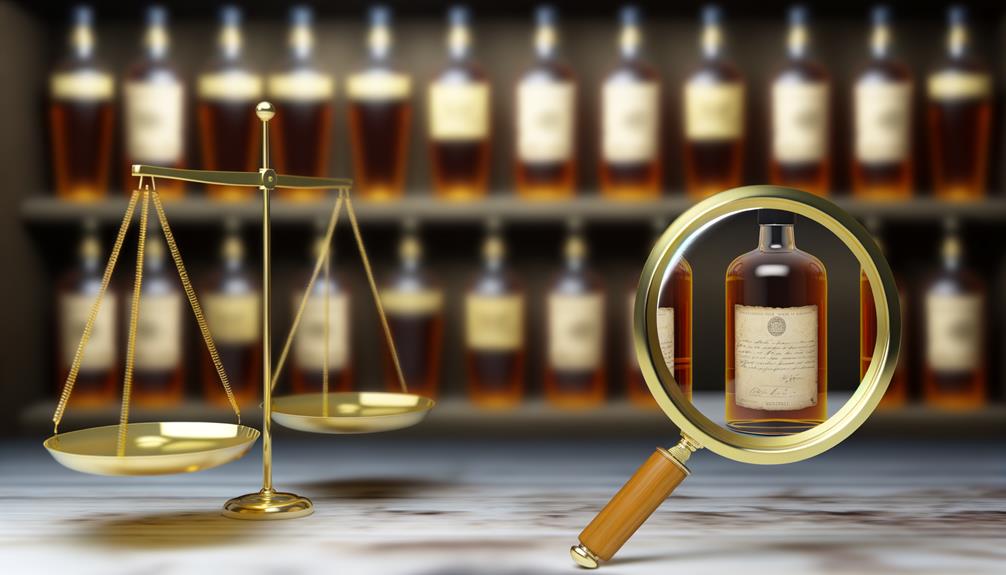
Let’s dive a bit deeper into the world of whiskey investment, shall we? There are some key elements to keep in mind that might steer your investment decisions in this thriving market.
One of the most important aspects to consider is your familiarity with brands and bottles. Knowing your stuff about big brands like Old Rip Van Winkle and Kentucky Straight Bourbon Whiskey is a must. If you can spot a rare bottle like a Single Malt Scotch Whisky, that’s a game-changer, and it can beef up your portfolio.
Next up, you’ve got to get a handle on the auction market. What is the worth of those rare bottles we mentioned? Auction trends and prices often determine it. So, keeping tabs on these factors can give you a clear idea of where your investments stand.
Of course, it’s always wise to spread your bets. Just like in any investment game, diversifying your portfolio is key. The more variety you have in whiskey brands and types, the better your safety net and chances of a higher return.
Finally, understanding the historical performance of whiskey, how it’s been delivering in terms of returns, and how easy it is to get your hands on can turn whiskey into a strong player in your investment game. With the right know-how and strategy, you can enter this profitable market and see serious returns from your whiskey investments.
Top Whiskey Bottles for Investment
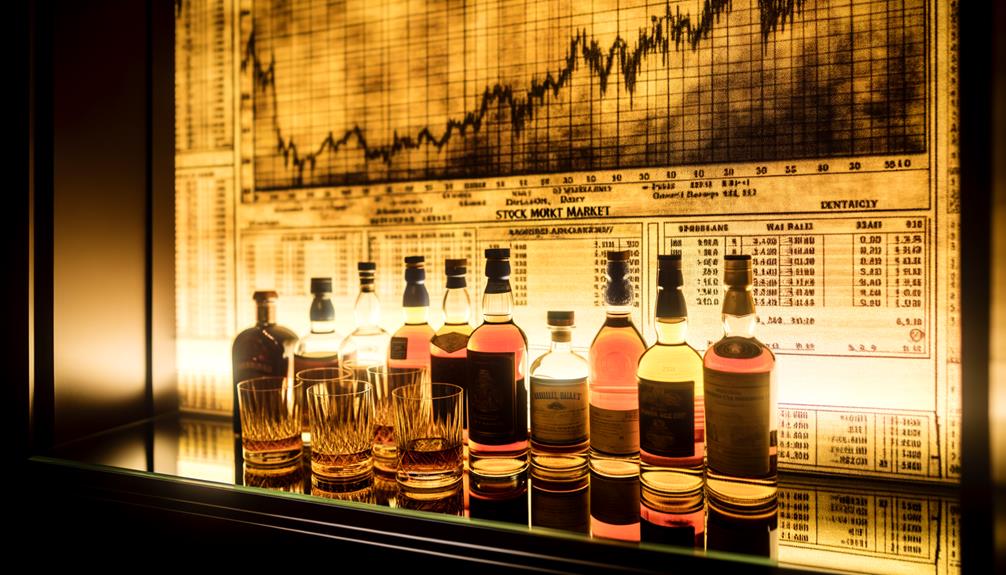
Let’s take a moment to talk about some really special whiskey bottles that make for a fantastic investment. We’re discussing treasures like the Bowmore Black Bowmore The Last Cask, 50-Year-Old, Old Rip Van Winkle, 25-Year-Old, and Karuizawa Ruby Geisha, 38-Year-Old. These bottles aren’t just known for their exquisite taste and impressive market value and growth trends. They’re often sold at auction, and let me tell you, they can command some steep prices on the secondary market.
To give you an idea:
| Whiskey | Annual Return |
|---|---|
| Bowmore Black Bowmore The Last Cask 50-Year-Old | 100.1% |
| Old Rip Van Winkle 25-Year-Old | 25% |
| Karuizawa Ruby Geisha 38-Year-Old | 35% |
These returns make investing in whiskey quite enticing. Auction houses are big players in this market, helping to facilitate the sale of these valuable bottles. By becoming a part of this niche world of whiskey investing, you get to appreciate the fine art of distillation and enjoy some financial benefits. But, like with any investment, it’s important to do your research. While these tips about valuable whiskey investments can be helpful, doing your due diligence is vital.
Investing in Whiskey Casks
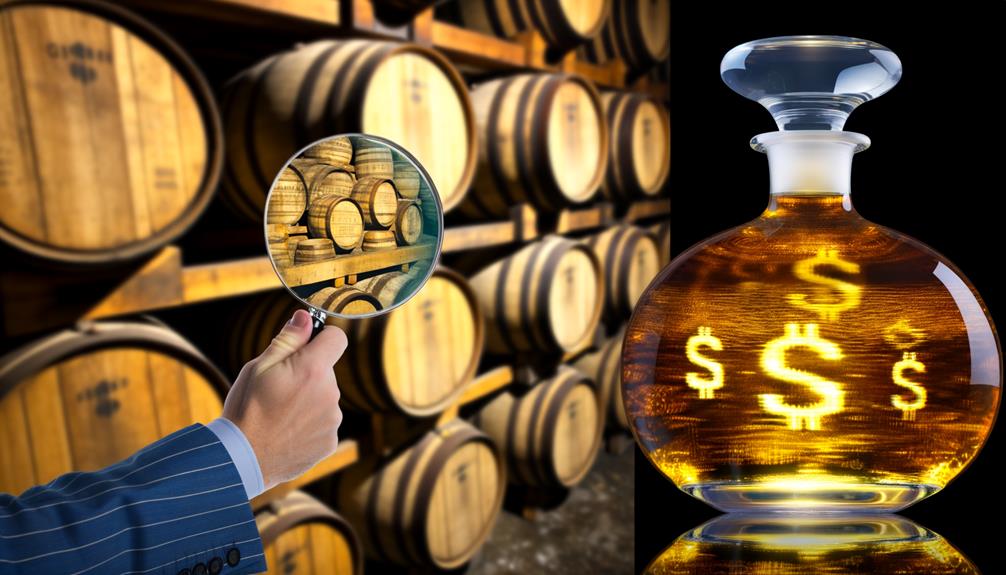
Investing in whiskey casks can be an interesting and potentially profitable venture. It can be a great alternative to investing in individual bottles of whiskey. So, why should you dip your toes into the world of whiskey cask investments? Well, it’s all about the rising demand for whiskey, particularly single malts, which can push the value of cask whiskey upwards.
To get your head around this idea of ‘liquid gold,’ let’s break it down:
- What is Cask Whiskey?
- Cask whiskey is a pure, untouched product that ages in barrels. As it gets older, its worth goes up.
- Why Pour Money into Casks?
- The value of aged whiskey in casks can increase significantly over the years.
- The growing love for whiskey, particularly single malts, paints a rosy picture for whiskey enthusiasts and investors.
However, investing in a whiskey cask isn’t as easy as choosing between bottles or casks. It demands a good understanding of the market, the aging process, and the knack for picking the right casks. But if you can navigate these waters, the potential returns make whiskey casks an appealing addition to your investment mix.
Frequently Asked Questions
What Whiskey Will Go Up in Value?
Forecasting the rise in whiskey’s worth isn’t as simple as black and white. It requires a bit of homework, keeping an eye on the market’s pulse, and some smart investing. Generally speaking, though, those hard-to-find, special edition bottles from well-known distilleries often fetch a higher price as years go by.
Is Collecting Whiskey a Good Investment?
Oh, you bet! Stashing away whiskey can turn out to be a savvy move. The market’s consistent upward trend and strong profit margins make it a feasible choice. However, don’t skip doing your homework and seeking professional guidance to get the most out of your venture.
Which Whiskey Is Worth Collecting?
If you want to invest, consider gathering a collection of unique, mature whiskies from world-famous distilleries. These whiskies tend to increase in value over time, particularly if stored in the right conditions. It’s important to note that a whiskey’s worth is determined by its scarcity, the length of its aging process, the reputation of its distillery, and the type of cask it was matured in.
What Makes Good Whisky Investment?
Isn’t a savvy whisky investment about seeking out those rare, coveted brands? It would be best to consider the bottle’s age, place in history, and potential to increase in value. But don’t forget, this isn’t about making a quick buck. It’s about playing the long game.

